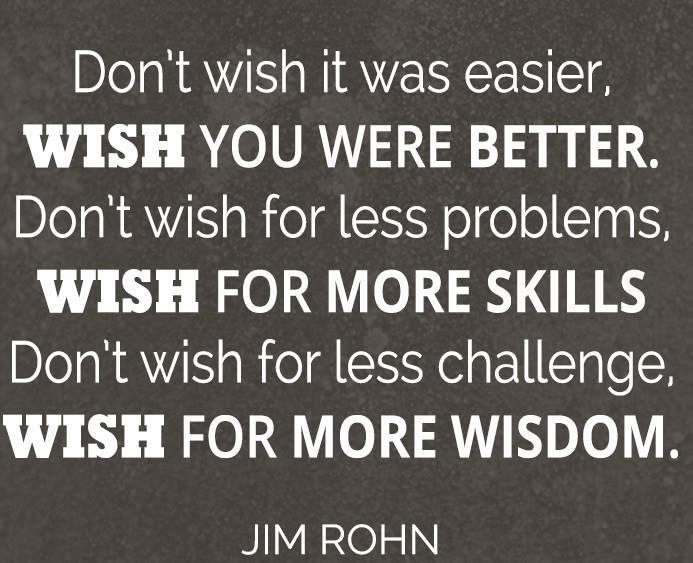it’s easy to do the little things, every day. It’s also easy not to do them.
In Leading an Inspired Life, author and motivational speaker Jim Rohn shares timeless insight on living an inspired life. Rohn distills some of the finest teachings from his mentor John Earl Shoaff and his own life philosophies such as seasons of life, law of averages, ant philosophy, visual chain thinking, snowball effect among others.
Chapter One – A Magic Word: Discipline
- We must unweave every strand of our cable of habits, slowly and methodically, until the cable that once held us in place becomes nothing more than scattered strands of wire.
- How do you get a miracle going? It’s all a matter of discipline. And it begins with one simple step: doing what you can do.
- Discipline enables you to capture your emotion and wisdom and translate them into action.
- Once you have seen and felt your ideal future, you will be ready and able to pay any price to get there.
Discipline is the bridge between thought and accomplishment, between inspiration and achievement, between necessity and productivity. Remember, all good things are located upstream from us. The passing of time takes us adrift, and drifting only brings us the negative, the disappointment, and the failure.
Failure is not a cataclysmic event. It is not generally the result of one major incident, but rather of a long list of accumulated little failings.
Discipline does many things, but most important of all is what it does for your mind-set—it makes you feel better about yourself. Even the smallest discipline can have an incredible effect on your attitude. And the good feeling you get—that surging feeling of self-worth that comes from starting a new discipline—is almost as good as the feeling that comes from the accomplishment the discipline brings.
Discipline: the continuing process that brings all the good things. Remember, anyone can start the process. It’s not, “If I could, I would;” rather, it’s “If I would, I could. If I will, I can.
Chapter Two – The Art of Personal Development
- It’s not what happens in the world that determines the major part of your future. What happens, happens to us all. The key is what you do about it.
- Whether you’re on your way to achieving your goals or you’ve already gotten there, you’ll be as happy as you make up your mind to be—right now.
- Accepting responsibility is one of the highest forms of human maturity. A willingness to be accountable, to put yourself on the line, is really the defining characteristic of adulthood.
- Once we understand and accept the truth, the promise of the future is freed from the shackles of deception.
If you will change yourself, everything else will change for you. You don’t have to change what’s outside, all you’ve got to change is what’s inside. To have more, you simply have to become more.
Don’t wish it were easier, wish that you were better. Don’t wish for fewer problems, wish for more skills. Start making these personal changes, and it will all change for you.

Work harder on yourself than you do on your job.
Success is something you attract because of the person you become. What you pursue usually eludes you like the butterfly you can’t quite catch. But if you want to be successful, you must attract success by developing the skills and the appropriate mind-set. What you learn about the marketplace and its goods and services… that’s what’s valuable. The key to getting paid very well in the marketplace is to develop very valuable skills.
“Faith isn’t faith unless it’s all you’re holding onto.”
Chapter Three: Setting Compelling Goals
Go where the expectations are so strong that they provoke you, push you, urgently insist that you not remain in one place. That way, you will grow and change.
Achievement depends on effective goal setting and monitoring in the same way that a successful drive to the grocery store depends on knowing when to apply the brakes and step on the gas pedal.
Ambitious people know that everything they do and every discipline they adhere to form the links in the chain of events that will lead them to their final destination.
Goal Setting
Goals are important for a genuinely success-oriented person. Without them, you’re just playing around. The difference between a goal-directed individual and someone without goals is like the difference between a Wimbledon champion and a kid batting a tennis ball around on a court with no net, no opponent to bring out the best in him, and no way of keeping score.
You may have to change planes in a different city, your flight may be canceled, or you may have to switch to another flight. You may not feel like talking to the person seated next to you. But you will persist. You know where you’re headed, and you’re quite determined to get there. That’s goal-directed behavior in its simplest form.
There are short-term goals and long-term goals. Sometimes, you’re flying across the country; other times, you’re just walking down to the corner grocery store. Long-term goals are the equivalent of a major journey. When you reach the point where you’ve achieved your long-term goals, your life will be fundamentally changed, and the process of getting to that point will have transformed you into a stronger, wiser, and higher-performing person.
Don’t join an “easy” crowd. You won’t grow. Go where the expectations are high. Go where the demands are high. Go where the pressure is to perform, to grow, to change, to read, to study, to develop new skills.
Go where the demands are high. Go where the expectations are so strong that they motivate you, push you, urgently insist that you not remain in the same place. That way, you will grow and change. So don’t set your goals too low.
Set the kind of goals that will transform your life, that will make you far better than you are, far stronger than you currently are. And you will behold. When your goals are truly important and meaningful to you, you will not only eventually achieve them, you will also deserve all of the rewards that you reap in the process of doing so.
Visual Chain Thinking
Your direction, activities, and disciplines all make up crucial links in your chain of success. When you can see that one thing affects everything else, when you come to realize that every discipline affects every discipline, when you look at your future as a chain that needs strong links all along the way… then you’ll build a reservoir of strength and courage that will serve you well during the down times.
Every action and every discipline achieved today is a link in the chain. Every action and every discipline achieved tomorrow is a link. And every action and every discipline achieved in the more distant future is also a link.
When you can see that every link in the chain will eventually lead you to the things you want most out of life and to the person you want to become, then you won’t grow discouraged, fearful, or impatient with today. When you can see where you’re going through visual chain thinking, even on the toughest days, you’ll keep moving toward your goals because you know where you’re going.
Chapter Four: The Power of Ideas
- The best money spent is the money spent to cultivate the genius of your own mind and spirit.
- Hear or read something challenging, something instructional, at least thirty minutes a day, every day. You can get along without some meals, but you can’t get along without some ideas, examples, and inspiration.
- Every day is a piece of the mosaic of your life. You need to capture the experience, the knowledge, the sights, the sounds, the panorama, the color, and the emotion so they will serve you for the future.
Finding the Right Combination
Ideas can change your life. And sometimes all you need is just one more good idea in a series of good ideas. It’s like dialing the numbers of a combination lock. After you’ve dialed five or six numbers, the lock may not come open. But you probably don’t need five or six more numbers. Maybe you need just one more number, one more idea. Maybe a seminar or a sermon can provide it. The lyrics from a song could do it. The dialogue from a movie could do it. Conversation with a friend might do it. If you keep your eyes and ears open, you’ll find that one last idea you need.
Warnings and Examples
Some human stories are called examples: do what these people did. Other human stories are called warnings: don’t do what these people did. What a wealth of information: knowing what to do and what not to do. If your story ever gets in somebody’s book, make sure they use it as an example, not a warning.
Brainstorming
Effective brainstorming can only happen if you disassociate from your ego. You can’t be worried about saying something stupid, or silly, or totally off-the-wall. Your silly thought may trigger someone else’s brain to take it one step further. Brainstorming in a group is an experience of collective thought. It’s an experience of developing one idea, or several ideas, through a variety of thought processes.
Chapter Five: The Driving Force of Motivation
- Once the lights went on for me, they have never gone out. I’ve had a few disappointments, but I’ve never lost that drive to do something unique with my life.
- Creating the perfect personal life takes just as much attention as creating the perfect professional life.
- Life is a bit of both up and down, but with true friends—friends who care regardless of your circumstances—the ups are more meaningful and the downs are less devastating.
- Happiness is the joy that comes from designing a life that practices the fine art of living well.
The Snowball Effect
Your successes fuel your ambition. Your successes give you extra energy. Your successes pave the way for more successes. It’s the snowball effect. When you achieve one success, you’re excited to meet another… and another… and another. Pretty soon, the disciplines that were so difficult in the beginning—the disciplines that got you going—are now part of your philosophy. And they keep you going.
Writing down problems
There’s something magical in identifying a problem. As soon as you start writing it out, you start figuring out ways to make it work. Perhaps the magic is that when you write it down, you can now be objective. You can start to objectively see where you fit into the picture.
You can start to see if you are being responsible and self-reliant. You are pondering all the relevant facts. You are trying to figure it all out. The fact that it is now on paper actually creates a space between you and the problem. And in this space that you have created, new solutions have room to grow.
The Good Life
Remember, the good life is not measured by material wealth or possessions. The good life is an attitude, an act, an idea, a discovery, a search. The good life comes from a lifestyle that is so fully developed—regardless of your bank account—that it provides you with a constant sense of joy in living. It fuels the fires of motivation to adopt a lifestyle that makes living worthwhile.
What is wealth without character, industry without art, quantity without quality, enterprise without satisfaction, possession without joy? Become a person of culture. Become that person of unusual substance who brings an added measure of genius to life so our children will be the beneficiaries.
“It’s not the amount that counts, it’s the style that counts.”
Happiness
Happiness is being able to explore all that life offers. Happiness is quite often found in having options—options of doing what you want to, instead of doing what you have to. The option of living where you want to, instead of living where you have to. The option of looking like you want to, instead of settling for what you have to look like.
Happiness is not in the getting. Happiness is in the becoming. Happiness is a universal quest. Happiness is a joy that comes as a result of positive activity.
Motivation is generated when there is a balance between the need for active achievement and the satisfaction in taking the time to acknowledge what you’ve already achieved.
Chapter Six: The Qualities of Skillful Leadership
- Humility is a grasp of the distance between us and the stars, yet having the feeling that we’re part of the stars.
- Part of the task of leadership is learning to spend eighty percent of your time with the twenty percent of the people who are doing eighty percent of the work.
- We can’t win everyone’s dedication and belief at once. What we can do is work on ourselves, refine our philosophies, and trust that the believers will be there.
- If you share a good idea often enough, it will fall on good people.
Learn to be strong but not impolite. Learn to be kind but not weak. Learn to be bold but not a bully. Learn to be humble, but not timid. Learn to be proud but not arrogant. Learn to develop humor without folly.
Ignorant arrogance
Ignorant arrogance is the worst kind. If someone is smart and arrogant, we can tolerate that. But if someone is ignorant and arrogant, that’s just too much to take.
Leadership is quite often an exercise in facing reality.
Good leadership sense.
Part of the task of leadership is learning to spend eighty percent of your time with the twenty percent who are doing eighty percent of the work. We would call that good leadership sense. Spend individual time with the twenty percent and group time with the eighty percent. This is an important aspect of skillful leadership.
Learn to spend eighty percent of your time as a leader with the twenty percent who deserve it.
Don’t Chase the Birds
There are many influences that pull people away from a good idea. That’s always going to be the case—the birds will always get some of the seed. When that happens, you may feel the need to chase the birds. But here’s the problem with this course of action:
If you go chasing birds to straighten things out, you have now left the field. The Law of Averages isn’t going to work for you until you get back into the field.
It is so important to know what is a good use of your time and what is a waste of time. Focusing on the negative is a waste of time. In fact, it is often a massive error in judgment. The best thing to do is to spend your energy and time on the things that count and understand the law of averages. Don’t chase the birds; it’s much more important to stay in the field.
Chapter Seven: The Road to Financial Independence
- Wealth is the possession of great financial resources that improve the quality of your life and give you added dignity and an expanded lifestyle.”
- What you do with what you have is more important than what you have.
- It’s hard to get rich fast. It’s easy to get rich slowly.
- Disciplines are those ingenious keys that unlock the door to the kind of person we really want to become. And in becoming that person, we attract all those treasures and values that most people would call ‘the good life.’
“It’s not the amount that counts, it’s the plan. It’s not what you allocate, it’s how you allocate.”
It’s hard to get rich quickly. It’s easy to get rich slowly. It doesn’t happen overnight. With conservative investments, it takes a while. It takes discipline to keep adding value to your future, a little every month. It takes time to build your fortune and create your financial independence.
Time, not timing.” It takes time. If playing the stock market is what you do, then you know that timing is a whole different ball game. But for the average person, it’s time.
Be patient in building your financial independence. It will come small steps at a time. It’s hard to be patient sometimes, but it’s just like achieving your goals: it happens one step at a time.
Mid Course Correction
Everything tends to get off course over time. When astronauts make a moon shot, they don’t stay on course throughout the whole trip. They have what are known as mid-course corrections—those fine-tuned changes that set you on a straighter course. And on the way to a destination as far as the moon, these slight changes are so important. If there’s one target you don’t want to miss, it’s the moon.
“If your ‘outgo’ exceeds your income, your upkeep becomes your downfall.”
The true blessings of life are illuminated by the contrasts. It’s hard to genuinely appreciate winning until you’ve done some losing. It’s hard to appreciate succeeding until you’ve done some failing. And once you’ve done some failing, success takes on even more worth and value.
On Life
Life is the struggle to keep death at a respectable distance. Death seems to want to move in prematurely, and you’ve got to push it back to live as long as you possibly can. Why? Because illness is out to push your health into a small corner.
The Seasons of Life
In rotation, the next season after fall is winter. And pray tell, how often does winter follow fall? Every time, without fail, for six thousand years that we know of. Of course, some winters are long and some are short, some are difficult and some are easy, but they always come right after fall. That isn’t going to change.”
Sometimes you can figure it out, sometimes there’s no way to figure it out. Sometimes it goes well, sometimes it gets in a knot. Sometimes it sails along, sometimes it goes in reverse. That’s not going to change. The last six thousand years read like this: opportunity mixed with difficulty. It isn’t going to change.
The only way it gets better for you is when you get better. Better is not something you wish for; better is something you become.
Be Prepared
By not being prepared, you make the choice of getting caught in some of life’s unpleasant circumstances, be they rain, failures, economic losses, relationship losses, professional losses, or personal losses. By not being prepared, by not thinking ahead, you have made your choice.
Here’s the other side of it. By being prepared, you increase your chances of success. You increase the likelihood of seizing opportunities when they come your way, of being ready within yourself to take advantage of once-in-a-lifetime situations.
it’s easy to do the little things, every day. It’s also easy not to do them.
All the Best in your quest to get Better. Don’t Settle: Live with Passion.



2 Comments
Pingback: 100 Books Reading Challenge 2021 – Lanre Dahunsi
Pingback: The Day that turns your life around. – Lanre Dahunsi